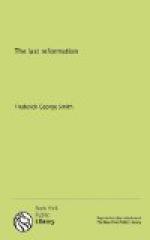According to this confession, all the ceremonial observances here set forth are without Scriptural authority. When we read in the New Testament concerning the simple act of baptizing believers, and compare it with the customs and practises that had grown up in the Ante-Nicene church, we do not wonder that evangelical faith was soon afterwards almost entirely lost in ritualistic forms; that, like the Pharisees of old, men made the faith of God of none effect by their traditions.
[Sidenote: False doctrines and heresies]
Another evidence of the decline of evangelical faith is found in the presence of many false doctrines among the leaders of so-called orthodox Christianity in that period of which I now write. Paul not only taught that at a later time some should “depart from the faith, giving heed to seducing spirits and devils” (1 Tim. 4:1), but he referred to some who had already “erred concerning the faith” (1 Tim. 6:21), and named two persons, ’who, concerning the truth, had erred, saying that the resurrection was past already, and overthrew the faith of some’ (2 Tim. 2:18). After the death of the apostles, error made deeper inroads, and its baneful influence cast a shadow over the church, which rapidly deepened into the darkness of spiritual night.
[Sidenote: Baptismal regeneration]
One of the earliest corruptions of apostolic truth concerned the design and purpose of baptism. It was not long until unscriptural significance was attached to the literal rite itself, so that what was originally a mere sign, was substituted for the thing signified, and thus baptism took the place of spiritual regeneration. In several places in the writings of Justin Martyr, who lived about the middle of the second century, his language seems to attach undue importance to the literal rite; but other passages from the same author indicate that he had not as yet entirely lost sight of the apostolic standard. In his Dialog with Trypho, chapter 14, he says: “We have believed and testify that that very baptism which he [Isaiah] announced is alone able to purify those who have repented ... and what is the use of that baptism which cleanses the flesh and body alone? Baptize the soul from wrath and covetousness, from envy and from hatred, and lo, the body is pure.”
In his First Apology, chapter 61, the same writer draws a clear Biblical distinction between spiritual regeneration secured through repentance and faith, and ritual regeneration in baptism as a mere outward sign of the inward work. He says: “I will also relate the manner in which we dedicated ourselves to God when we had been made new through Christ ... as many as are persuaded and believe that what we teach and say is truth, and undertake to be able to live accordingly, are instructed to pray and to entreat God with fasting for the remission of their sins that are past, we praying and fasting with them. Then they are brought by us where there is water and are regenerated in the same manner in which we were ourselves regenerated. For, in the name of God, the Father and Lord of the Universe, and of our Savior Jesus Christ, and of the Holy Spirit, they then receive the washing with water.”




